Security Chief Likens Iran’s Nuclear Capabilities To 'Sword Of Damocles'
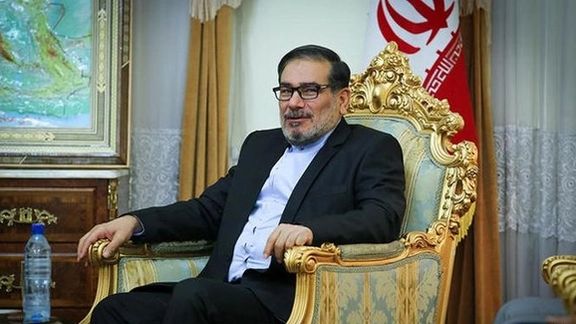
Iran's top security official says Tehran’s “peaceful” nuclear capabilities must always remain like “sword of Damocles” above the heads of the violators of the JCPOA.

Iran's top security official says Tehran’s “peaceful” nuclear capabilities must always remain like “sword of Damocles” above the heads of the violators of the JCPOA.
The secretary of Iran’s Supreme National Security Council, Ali Shamkhani, made the remarks on Tuesday as top diplomats engaged in the Vienna talks say the negotiations are nearing the finish line.
“Peaceful capability of Iran's nuclear program must always remain like the sword of Damocles above the heads of violators as a real guarantee for fulfillment of their obligations”, Shamkhani tweeted.
“After US withdrawal from JCPOA in 2018, it was better to use this inherent guarantee more effectively”, he added in a tweet.
Shamkhani’s contradictory remark about “peaceful capability” and a “sword” might be referring to Iran’s advanced knowledge of uranium enrichment and its possession of thousands of enrichment machines called centrifuges.
It is not clear if the imminent agreement in Vienna would address Iran’s enrichment infrastructure and the stockpile of refined fissile materials it has built ap in over a year.
Shamkhani has been sounding negative about the negotiations in recent days and insisting on the removal of all sanctions imposed since 2018 when former US president Donald Trump left the JCPOA.
Last week, he said the United States and its European allies have failed to live up to their commitments under the 2015 deal, rendering the JCPOA an empty shell, noting that Iran has not reaped any economic benefit from the agreement.
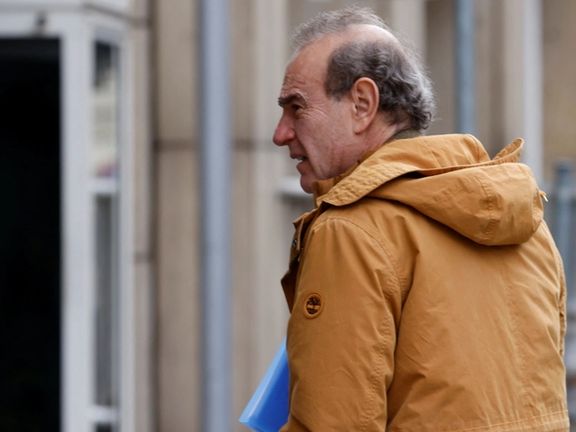
The European Union coordinator of the Vienna nuclear talks has reiterated that negotiations are at a crucial point with the result still uncertain.
“We are nearing the end after ten months of negotiations,” wrote Enrique Mora, a senior EU official, in a tweet Tuesday. All delegations were in intense talks, Mora noted, as “key issues need to be fixed” in agreeing the revival of the 2015 Iran nuclear deal, the JCPOA (Joint Comprehensive Plan of Action).
Stephanie Al-Qaq, the lead British negotiator in Vienna, tweeted that the talks were “in the end game,” and that it was “time for us to conclude.”
A positive note came from Mikhail Ulyanov, Russia’s lead negotiator. “Apparently the negotiations on restoration of the JCPOA are about to cross the finish line,” he tweeted after exchanging views with Mora on the current state of affairs.
Media interest in the Vienna nuclear negotiations has increased during recent weeks with reports that agreement was close. Tehran has called for the removal of all sanctions imposed under the ‘maximum pressure’ introduced by President Donald Trump as he withdrew the US from the JCPOA in 2018, but deciding which sanctions contravene the JCPOA has proved contentious.

While some diplomats say a nuclear deal with the West is likely within the next week, Iranian lawmakers have a feeling they have been left out of the process.
Some 250 Iranian lawmakers on Sunday called for a guarantee to ensure that the United States will not pull out of an agreement with Iran once again. They also demanded that all the sanctions against Iran should be lifted before any new agreement.
While foreign ministry spokesman Saeed Khatibazadeh also insisted on Monday that sanctions should be lifted, he pointed out that Iran's Supreme Council of National Security is the body that decides on the nuclear deal. The SCNS is believed to be a front for Supreme Leader Ali Khamenei who steers the negotiations from behind the scenes.
Also on Monday, reformist lawmaker from Tabriz Massoud Pezeshkian said that the Majles has not been informed of the details of the negotiations in Vienna at all, noting that everything about the negotiations is being managed by the SCNS.
Based on a December 2020 legislation that called for reducing Iran's commitments under the JCPOA, the Iranian negotiating team is required to brief the Majles on the talks from time to time. The legislation at the time was touted as putting a clear legal responsibility on the government to escalate the nuclear crisis. However, according to Pezeshkian, the Majles has been left in the dark and the negotiations are being furthered based on attestations made by the SCNS.
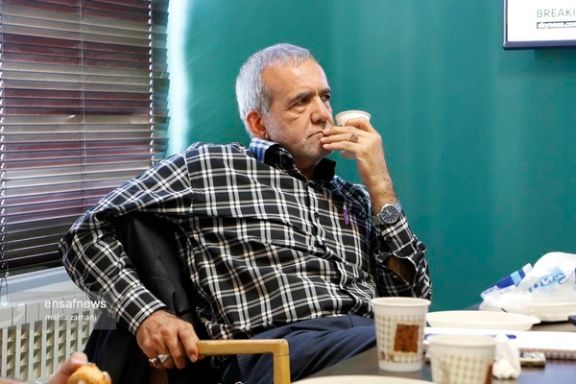
The legislation known as Strategic Action to Lift the Sanctions and Protect Iranian Nation's Interests, appears to have been totally ignored by the negotiators and the SCNS and this, according to Pezshkian, is against the law. "Now we should ask the lawmakers who defended and approved the legislation why the law was made and why the Majles has not been briefed about the results of negotiations," Pezeshkian said, adding that "The government and the foreign ministry do not tell us anything about the talks."
The prominent lawmaker added that even the foreign ministry is not aware of what is going on in Vienna. "They make all the decisions at the Supreme Council of National Security and then tell the foreign ministry to follow up on matters," Pezeshkian said. Nonetheless, he said it is unlikely that differences would occur between the Majles and the government as both bodies belong to the same part of the Iranian political landscape.
While a significant part of Iran's economic problems are related to United States’ sanctions, SCNS Chief Ali Shamkhani insisted on Monday that holding negotiations with the Washington is not on the agenda of the Iranian negotiating team. "Negotiation with US is not on the agenda of the Iranian team because it will not be the source of any progress," he said.
This comes while President Ebrahim Raisi who visited Qatar on Monday appears to have agreed with Doha's mediation between Tehran and Washington. Political commentators who have spoken to Iran International TV unanimously agreed that Qatar is playing a mediation role between Iran and the US particularly about a planned prisoner swap. Commentator Ali Sadrzadeh said that Qatar appears to have replaced Oman in the indirect negotiations between Tehran and Washington particularly about arranging a prisoner swap.
According to conservative Nameh News website, "both Iran and the United States need an agreement. The United States does not say that as elaborately as Iran does. Iran has to surrender to an agreement that fulfils its minimal expectations to put an end to its nation's financial hardships. As both sides need an agreement, it is likely that there will be one within a few weeks."
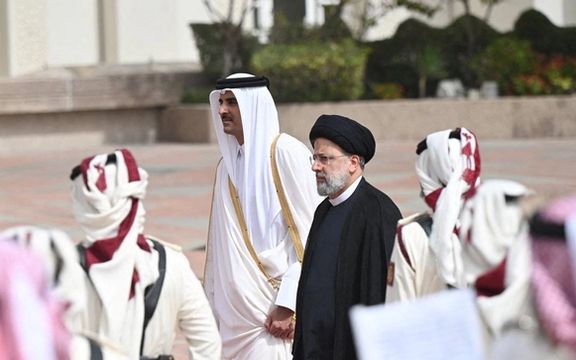
Iran’s President Ebrahim Raisi said Monday that nuclear talks in Vienna cannot succeed unless the United States is prepared to lift "major" sanctions.
Reuters reported last week that a US-Iranian deal is taking shape in Vienna after months of indirect talks to revive a pact Washington abandoned in 2018 under then-President Donald Trump.
"The United States must prove its will to lift major sanctions," Raisi said in a joint news conference with Qatari Emir Sheikh Tamim bin Hamad al-Thani in Doha.
"To reach an agreement, guarantees are necessary for negotiations and nuclear issues."
The draft text of the agreement also alluded to other issues, including unfreezing billions of dollars in Iranian funds in South Korean banks, and the release of Western prisoners held in Iran.
"Aggression is bound to fail. Resistance has brought results and none of the regional issues have a military solution," Raisi said.
Raisi was more cautious than Iranian foreign ministry spokesman Saeed Khatibzadeh, who said earlier that the Vienna negotiations had made "significant progress".
Khatibzadeh also said that "nothing is agreed until everything is agreed" in the Vienna talks. "The remaining issues are the hardest," he told a weekly press briefing.
Khatibzadeh said that Iran’s top security body, the Supreme National Security Council, handles the Vienna talks. It reports directly to Supreme Leader Ayatollah Ali Khamenei.
Reporting by Reuters
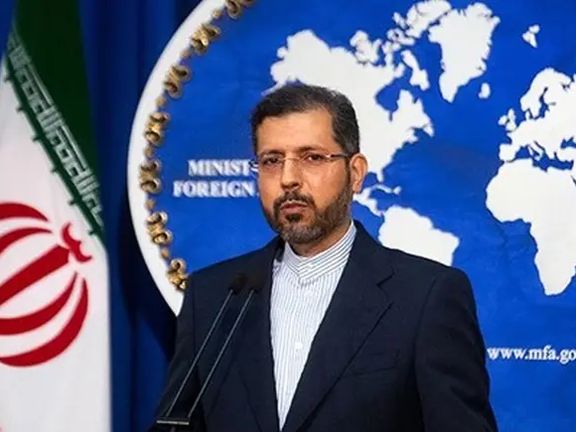
After parliament Sunday passed a motion setting conditions for reviving the 2015 nuclear deal, Iran’s foreign ministry made clear where decisions were taken.
"The Supreme National Security Council is responsible for managing the talks in Vienna," Saeed Khatibzadeh told his weekly press conference in Tehran Monday. "We have heard the voices of the people's representatives both in private and in public. The government has made every effort, and will continue to do so to act within the framework of their implementational and feasible views.”
The Supreme National Security Council (SNSC) – which has 23 members, including the president, chief justice, various ministers and military commanders − sets security policy, including Iran’s approach to nuclear talks.
Since the 2020 parliamentary election, a majority of parliament oppose, or at least are skeptical about the 2015 deal, the JCPOA (Joint Comprehensive Plan of Action), and last year passed legislation requiring a scaling up of the nuclear program.
On Sunday, 250 out of the 290 parliamentarians voted for a motion referring to red lines Iran should not breach, including sanctions “imposed on the country under numerous pretexts, including nuclear activity, missile development, and human rights violations.” The motion said that the United States and skeptical the three European JCPOA signatories should lift sanctions imposed under Countering America's Adversaries Through Sanctions Act (CAATSA), the CAATSA U-turn, and the Iran Sanctions Act (ISA).
Khatibzadeh reiterated that talks in Vienna aiming to revive the 2015 accord would continue within JCPOA structures and that Iran would not enter direct bilateral talks with the US. He pointed out that the previous administration of Donald Trump, like the current administration of President Joe Biden, had sought direct talks. "Today we exchange non-papers with the US indirectly,” the spokesman noted. “They can't expect to see different outcomes when their policies are the same."
In a tweet Monday, Ali Shamkhani concurred. "Negotiation with US is not on the agenda of Iranian team because it will not be the source of any progress," he wrote.
A few weeks ago, Shamkhani and foreign minister Amir-Abdollahian both said that direct talks with the US were possible. This prompted criticism from, among others, editor of Kayhan newspaper Hossein Shariatmadari, a veteran opponent of nuclear talks, the JCPOA, and past bilateral talks with the US over Iraq, Afghanistan and the nuclear program.
Opponents of the JCPOA, like their counterparts in the US, have been increasingly vocal in past weeks as the Vienna talks reportedly made progress.
In a report published by Iran Diplomacy website January 26, conservative commentator Jalal Khoshchehreh said Iran had softened over direct talks with Washington following President Ebrahim Raisi's visit to Moscow. Raisi himself, however, implied on live TV January 25 that such talks are possible only if the US first lifted ‘maximum pressure’ sanctions.
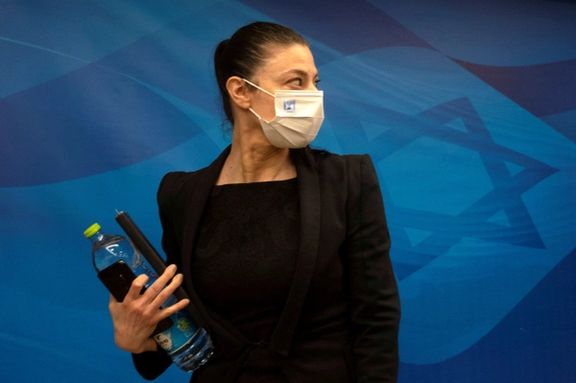
Israel will address its misgivings about an emerging new Iran nuclear deal in future bilateral arrangements with the United States, an official said on Monday.
Israel, which is not a party to nuclear negotiations between Iran and world powers in Vienna, has voiced concern that they could produce a revived deal that "create(s) a more violent, more volatile Middle East".
Transportation Minister Merav Michaeli, a member of Israel's decision-making security cabinet, said that as a center-left opposition lawmaker in 2015 she had supported the then-nuclear deal with Iran - which the Trump administration later withdrew from.
But, she said, "this (emerging) deal is much shorter, with many more sunsets, with many, many more - I would say - bad opportunities, cracks. And yes, it's very, very problematic".
"So we are doing whatever we can to make it as best as possible," Michaeli, speaking in English, told the Conference of Presidents of Major Jewish Organizations in Jerusalem.
"We will have to work on a complementary agreement between Israel and the US"
She did not elaborate. Israeli leaders have previously asserted that their country would not be bound by any nuclear deal and could take unilateral military action against their arch-foe if they believed it was required to deny it nuclear weapons. Iran denies seeking such weapons.
Reuters Report